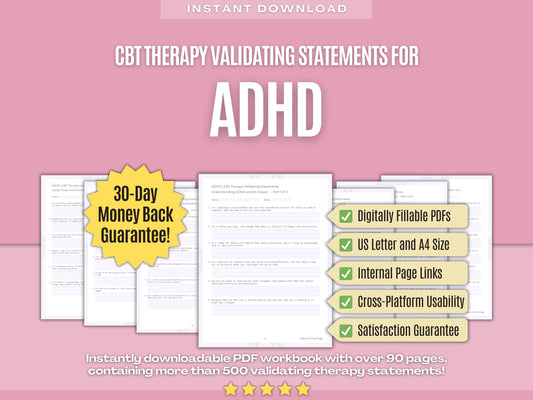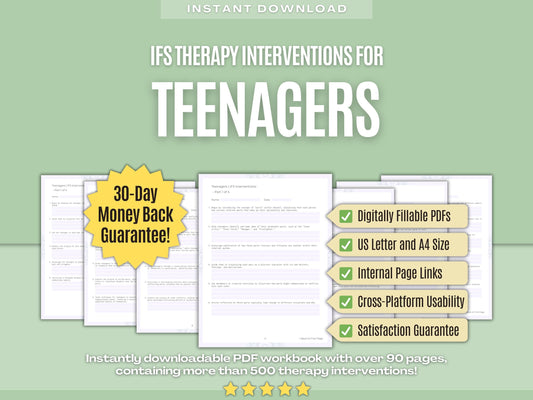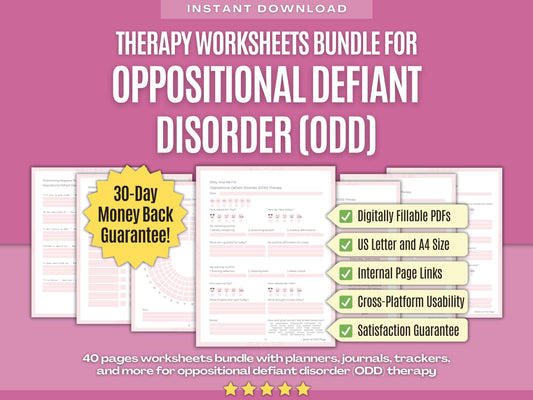Elevate Your Therapy and Guide Your Clients to Inner Healing with Our Obsessive-Compulsive Disorder (OCD) Therapy Session Questions! ✨
1. Beginning OCD Management
- How have you been feeling since our last session in terms of managing your OCD symptoms?
- Have you noticed any changes in the frequency or intensity of your obsessive thoughts or compulsive behaviors?
- Are there any situations or triggers where you've been able to successfully resist engaging in compulsive behaviors?
- Have you been able to challenge any of the irrational beliefs or fears that underlie your OCD symptoms?
- How would you rate your level of confidence in your ability to effectively manage your OCD symptoms going forward?
- Have you noticed any improvements in your overall mood or quality of life as a result of addressing your OCD symptoms?
- Are there any specific goals or milestones you would like to achieve in the next phase of your treatment?
- What strategies have you found effective for coping with the anxiety or discomfort that arises when resisting compulsions?
- How do you feel about incorporating mindfulness or relaxation techniques into your daily routine to help manage stress and anxiety?
- What are your thoughts on gradually reducing the time or frequency of engaging in compulsive rituals as part of your treatment plan?
- Are there any specific situations or scenarios where you anticipate needing additional support or guidance from your therapist?
2. Understanding OCD
- Can you describe some of the specific obsessive thoughts or fears that commonly plague you?
- Can you identify any patterns or themes among your obsessive thoughts?
- How do you typically respond when faced with these intrusive thoughts or fears?
- What purpose or function do you believe these compulsive behaviors serve for you?
- How do you feel when you try to resist engaging in compulsive behaviors?
- How do your OCD symptoms impact your daily life, including your relationships, work, and leisure activities?
- Have you noticed any changes in your OCD symptoms over time, such as worsening or improving?
- Can you describe any efforts you've made in the past to try and manage or control your OCD symptoms?
- How do you feel about seeking therapy to address your OCD symptoms?
- How do you view the relationship between your thoughts, feelings, and behaviors in the context of your OCD?
- Can you identify any strengths or coping skills that you possess which might help you in managing your OCD symptoms?
3. Mindfulness for OCD
- Can you describe your understanding of mindfulness and how you currently practice it, if at all?
- Can you identify any moments in your day-to-day life where you feel present and engaged in the present moment?
- Have you ever tried using mindfulness techniques to observe your obsessive thoughts without reacting to them?
- Can you envision incorporating mindfulness practices into your daily routine to help manage your OCD symptoms?
- Are there any specific mindfulness exercises or techniques you're interested in exploring as part of your OCD therapy?
- Can you recall any moments where you've been able to observe your OCD symptoms without getting caught up in them?
- How do you typically react when you notice yourself getting caught up in a cycle of obsessive thoughts and compulsive behaviors?
- Can you identify any barriers or challenges that might make it difficult for you to practice mindfulness regularly?
- Have you ever tried using mindfulness to bring awareness to the physical sensations associated with your OCD symptoms?
- Can you imagine using mindfulness to help you disengage from the urge to perform compulsive rituals?
- Are there any misconceptions or concerns you have about practicing mindfulness in the context of your OCD?
4. Dialectical Behavior Therapy (DBT) for Emotional Regulation
- Can you describe your understanding of dialectical behavior therapy (DBT) and its potential application in managing emotional regulation difficulties associated with OCD?
- Can you identify any specific triggers or situations that tend to provoke strong emotional reactions for you?
- Are you familiar with the concept of mindfulness and its role in DBT for emotional regulation?
- What are your thoughts on the idea of developing distress tolerance skills to help you cope with moments of emotional crisis or overwhelm?
- Can you recall any instances where you've been able to effectively regulate your emotions in the face of OCD-related triggers?
- Can you identify any patterns or cycles in your emotional responses to your OCD symptoms?
- How do you currently express or communicate your emotions to others, especially when they relate to your OCD symptoms?
- How do you typically respond when you perceive a discrepancy between your emotional experiences and the expectations of others?
- Can you identify any obstacles or challenges that might make it difficult for you to regulate your emotions effectively?
- How do you envision incorporating emotion regulation techniques into your daily life outside of therapy sessions?
- What are your concerns or fears about the process of learning and practicing DBT skills for emotional regulation?
5. Interpersonal Therapy (IPT) for Relationship Challenges
- Can you describe your understanding of interpersonal therapy (IPT) and its potential application in addressing relationship challenges related to OCD?
- Can you identify any specific interpersonal difficulties or conflicts that arise as a result of your OCD symptoms?
- Are you familiar with the concept of communication patterns and how they might contribute to relationship challenges related to OCD?
- What are your thoughts on the idea of identifying and addressing any role conflicts or interpersonal role disputes that arise within your relationships due to your OCD?
- Can you recall any instances where your OCD symptoms have led to misunderstandings or conflicts with your loved ones?
- Can you identify any specific needs or desires you have in your relationships that might be affected by your OCD symptoms?
- How do you typically respond when you notice your OCD symptoms interfering with your ability to engage in meaningful interactions with others?
- How do you currently seek support or validation from your loved ones regarding your OCD symptoms?
- How do you envision navigating the delicate balance between seeking support from your loved ones and maintaining independence in managing your OCD symptoms?
- Can you recall any instances where your OCD symptoms have led to feelings of isolation or loneliness within your relationships?
- What are your hopes or goals for improving your relationships through IPT in the context of managing your OCD symptoms?
6. Emotion-Focused Therapy (EFT) for Anxiety
- Can you describe your understanding of emotion-focused therapy (EFT) and how you think it might be beneficial in addressing anxiety related to OCD?
- Can you identify any specific emotional triggers or situations that tend to exacerbate your anxiety related to OCD?
- Are you familiar with the concept of emotional regulation and its role in managing anxiety and other emotions associated with OCD?
- What are your thoughts on the idea of identifying and processing any unresolved emotions or traumas that might contribute to your anxiety related to OCD?
- Can you recall any instances where you've been able to effectively manage your anxiety related to OCD through emotion-focused strategies?
- Can you identify any patterns or cycles in your emotional responses to your OCD symptoms?
- How do you typically respond when you notice yourself trying to suppress or avoid uncomfortable emotions related to your OCD?
- How do you currently seek support or validation for your emotional experiences in the context of your OCD symptoms?
- How do you perceive the relationship between your emotions and your compulsive behaviors or obsessive thoughts?
- Can you identify any strengths or coping strategies you possess that have helped you manage anxiety related to OCD in the past?
- What are your hopes or aspirations for yourself in terms of managing anxiety related to OCD through EFT?
7. Psychodynamic Understanding of OCD
- Can you describe your understanding of the psychodynamic approach to OCD and how you believe it might offer insights into your symptoms?
- Can you identify any early life experiences or significant relationships that you believe may have contributed to the development of your OCD symptoms?
- Are you familiar with the concept of unconscious conflicts and how they might manifest in the form of obsessive-compulsive symptoms?
- What are your thoughts on the idea of examining unconscious fears, desires, or traumas that may be influencing your OCD symptoms?
- Can you recall any significant life events or transitions that coincide with the onset or exacerbation of your OCD symptoms?
- Can you identify any recurrent themes or symbols in your obsessive thoughts or compulsive behaviors that might hold deeper psychological significance?
- How do you currently perceive yourself and your identity in relation to your OCD symptoms?
- How do you typically respond when faced with uncertainty or ambiguity, which often triggers your obsessive thoughts or compulsive behaviors?
- What are your concerns or fears about delving into the deeper psychological roots of your OCD symptoms?
- Can you recall any instances where you've experienced moments of insight or understanding about the psychological underpinnings of your OCD symptoms?
- What are your hopes or aspirations for yourself in terms of integrating psychodynamic insights into your understanding and management of OCD?
8. Soothing with Music Therapy
- How does music impact your mood and emotional state when you're feeling overwhelmed by OCD symptoms?
- What genres or styles of music do you find most soothing or calming, and why do you think they have this effect on you?
- How does listening to music influence your ability to focus or redirect your attention away from intrusive thoughts or compulsive behaviors?
- Do you use music as a form of self-expression, and if yes, how does it help you communicate feelings or experiences related to your OCD?
- How do you incorporate music into your daily routine or self-care practices to support your overall well-being?
- Do certain songs or melodies trigger memories or associations that are linked to your OCD, and how do you navigate these experiences?
- How does the act of playing a musical instrument or singing impact your mood and sense of control over your thoughts and behaviors?
- How do you incorporate mindfulness or relaxation techniques into your experience of listening to music as a therapeutic practice?
- How do you balance the desire for structure and predictability in music with the potential for spontaneity and emotional expression?
- How does the social context in which you listen to music influence its therapeutic effects, such as listening alone versus with others?
- Have you noticed any changes in your relationship with music over time as you've progressed in your journey of managing OCD?
9. Concluding OCD Therapy
- Reflecting on your journey in OCD therapy, what are some key insights or realizations you've gained about yourself and your relationship with OCD?
- Can you identify any specific coping strategies or tools that you've found particularly helpful in managing your OCD symptoms?
- Have you noticed any patterns in your progress or setbacks throughout the course of treatment, and if so, what do you think contributed to these patterns?
- Can you recall any significant breakthrough moments or "aha" experiences that occurred during therapy, and how did they influence your perspective on recovery?
- How have you applied the skills and insights gained in therapy to navigate real-life situations and challenges outside of the therapy room?
- Have you noticed any changes in your relationships with friends, family members, or others in your social circle as a result of participating in therapy for OCD?
- What are your thoughts and feelings about transitioning out of regular therapy sessions for OCD, and are there any concerns or apprehensions you have about this transition?
- How do you envision incorporating self-care practices and ongoing support systems into your post-therapy routine to promote your mental health and well-being?
- What advice or insights would you offer to someone who is considering seeking therapy for OCD or is currently in the early stages of treatment?
- What are some specific goals or aspirations you have for yourself moving forward in your journey of managing OCD and pursuing a fulfilling life?
- How do you plan to integrate the lessons learned from therapy into your identity and sense of self moving forward?
10. Reflections on the Therapy Journey
- As you reflect on your journey in OCD therapy, what are some of the most significant changes or improvements you've noticed in yourself since beginning treatment?
- How has your understanding of OCD evolved throughout the course of therapy, and what new insights have you gained about the nature of your symptoms and triggers?
- Looking back on your experiences in therapy, what are some of the most important lessons you've learned about yourself, your strengths, and your capacity for growth?
- What role has the therapeutic relationship with your therapist played in your journey of healing and self-discovery, and how has it supported your progress?
- How have you applied the skills and insights gained in therapy to navigate real-life situations and challenges outside of the therapy room?
- How do you plan to maintain the progress you've made in therapy and continue applying the strategies you've learned to manage your OCD symptoms in the future?
- What are some self-affirming statements or beliefs you can hold onto as you continue on your journey of managing OCD and pursuing a fulfilling life?
- Can you identify any areas of personal growth or strengths that have emerged as a result of your experience in OCD therapy?
- How do you plan to communicate with your therapist or mental health provider if you experience a recurrence of symptoms or feel the need for additional support in the future?
- How do you plan to integrate the lessons learned from therapy into your identity and sense of self moving forward?
- How do you plan to maintain a sense of agency and empowerment in managing your OCD symptoms and pursuing your personal goals beyond the formal structure of therapy sessions?
We hope that our therapy session questions for Obsessive-Compulsive Disorder (OCD) therapy will help you to elevate your therapy practice and guide your clients to inner healing! Do you need more therapy session questions for Obsessive-Compulsive Disorder (OCD) therapy? Find them all in our Digital Workbook! Or do you have any questions or suggestions for us? Please feel free to contact us at any time!


















